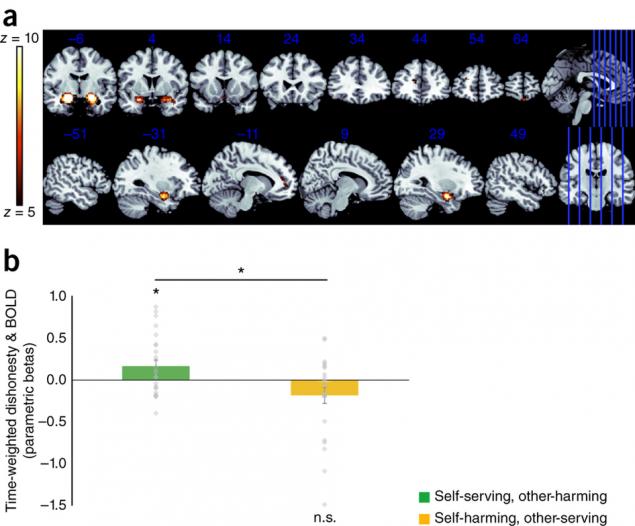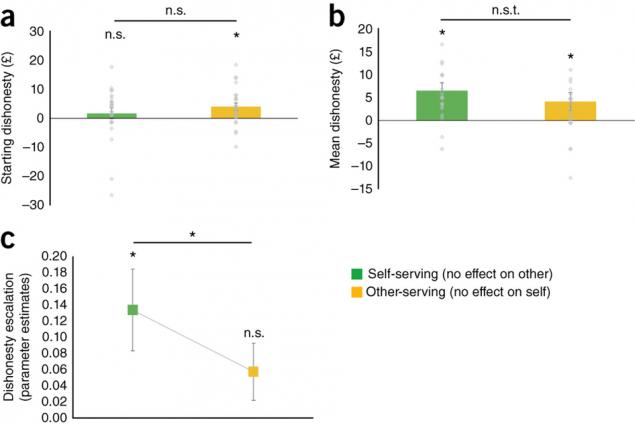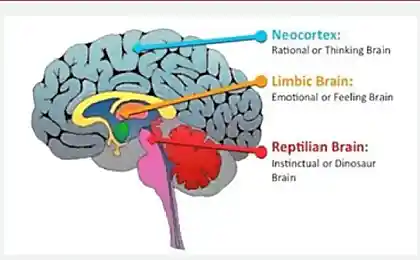866
Scientists have discovered how the human brain adapts to lies

A team of researchers from University College London established empirically that the smallest lie can lead to uncontrollable consequences. When you stretch the truth for their own benefit, sooner or later you have to come up with a new lie to support the previous one. With time, grows the whole web, which primarily harms its Creator. Scientists presented the first empirical evidence of how selfish one lie wrapped in another, and showed how and why this happens in our heads.
A lie is an integral part of the social world, affecting many areas from personal relationships to politics and Economics. In conversations with researchers, many scammers were described as minor lies pushed them to the crimes. However, until now no one has conducted an experiment that could prove such a hypothesis. Scientists have set themselves the task of experimentally to demonstrate gradual increase in the frequency of lies and to explore the mechanism that this process is controlled. Their main goal was to find out whether the dishonesty escalates over time, or decreasing a reaction to a lie the tonsils. The results of the study were published October 24 in the journal Nature Neuriscience.
The experiment involved men and women aged 18 to 65 years. Some of them carried out tasks in the MRI chamber, while others were tested in test boxes. The experimental participant was paired with an "actor" who was presented as one of the same subjects. The subjects were assigned the role of Advisor and "actor" — the role of the appraiser. The experiment was developed according to several scenarios. In the beginning of the experiment evaluator and Advisor were placed in different rooms. Then within 4 seconds the EA showed a picture of a jar of coins. The adviser had to guess what amount is in the Bank and send you a reply via your computer evaluator. The appraiser showed the same picture for 1 second, and then he had to consult the option adviser, make the decision and announce it. For the most accurate answer will get the bonuses of both and the evaluator, and Advisor. In this case, the subject did not have to dissemble, but in the second part of the experiment, the events developed much more interesting.
In the next phases of the EA were privately informed that the amount in each jar will vary in the range from 15 to 35 British pounds, and that his partner doesn't know about it. Overestimating or underestimating the number of coins in the Bank, the Advisor wins the amount that he can fool the appraiser. And the longer the experiment, the more participants distorted information about the amount of money in the Bank. If the first time advisers have distorted the data for 1-2 of the British pound sterling by the end of this difference was already 8.
When the subject was lying for the first time, the amygdala in his brain responsible for emotion were particularly active. This part of the brain makes you feel bad when we lie. However, with each subsequent lie, the activity of the tonsils is reduced, a person no longer feels the "stop-signal" and continues to speak the truth. So the researchers found that the stronger decreases the activity of the tonsils, the more one lies, acquires new details in proportion to the time that is spent on a deception. Simply put, the more time — the bigger the lie. This process can be called emotional adaptation.

Reduced sensitivity to lies for a long time
The idea is that when a person is first confronted with emotional stimuli, for example, photograph the scene of the accident, it is quite serious is experiencing. Neurons in the tonsils, literally, a bright flash. But if this person becomes, for example, the forensic expert who, every day and only does what works for the scene or looking at the pictures from the scene, the brain adapts and the neurons calm down. He no longer reacts so emotionally. This is true for many other sensual experiences.
"This is a very interesting look at how the brain reacts to repeated and increasing acts of deception. You must conduct a number of tests to accurately establish a relationship of lies and blunting of emotional response. Perhaps the effect of the gradual increase can be observed in other types of conduct," said Dr. Ralise Stoyanov, senior software developer projects in the group of cognitive neuroscience and mental health Wellcome Trust.
Scientists suggest that the weakening of the reaction of the tonsils in response to the lie could reflect a decrease in emotional reactions to the adoption of the "fraudulent" decisions or their incorrect assessment, the visibility of the fact of lying to humans. In addition, test results indicate that the gradual strengthening of dishonesty depends on the motivation, which pushes to lie. When participants cheated in favor of someone else, they don't start to lie more or less, but doing it constantly at the same level. But as soon as it came to personal gain, with every new deception, the boundaries were moved.

The reaction of the brain to lie depending on motivation
However, it is worth to mention that not all people are equally a lot of lies. 25 of 80 participants were assessed in the second phase of the study using fMRI. It was found that those participants who greatly exaggerated the amount in the course of the experiment, neural activity has decreased. As a rule, those who lied during the experiment, reported that they were inclined to cheat in real life. This fact has not yet been published, but was discussed in the briefing. Therefore, we can assume that not all of us are doomed often to lie.
But do not think like you are invincible. Head of the research group Neal Garrett stressed that the tiny cheating can be dangerous for the simple reason that every successful lie is a biological predisposition to dream on, inventing, perhaps more.
The reduction reaction of the tonsils, according to researchers, can have serious consequences that spread to other areas of decision-making. They may include, for example, outbursts of aggression. Taken together, the results of the study showed that the biological mechanism that underlies the gradual increase of lie, provides a new understanding of this component of human behavior.
Source: geektimes.ru/post/281854/
The installation of quality PVC Windows "Windows May" is the best way to keep the warmth, comfort and coziness in the house
The global myth of the progesterone — read for all women!























